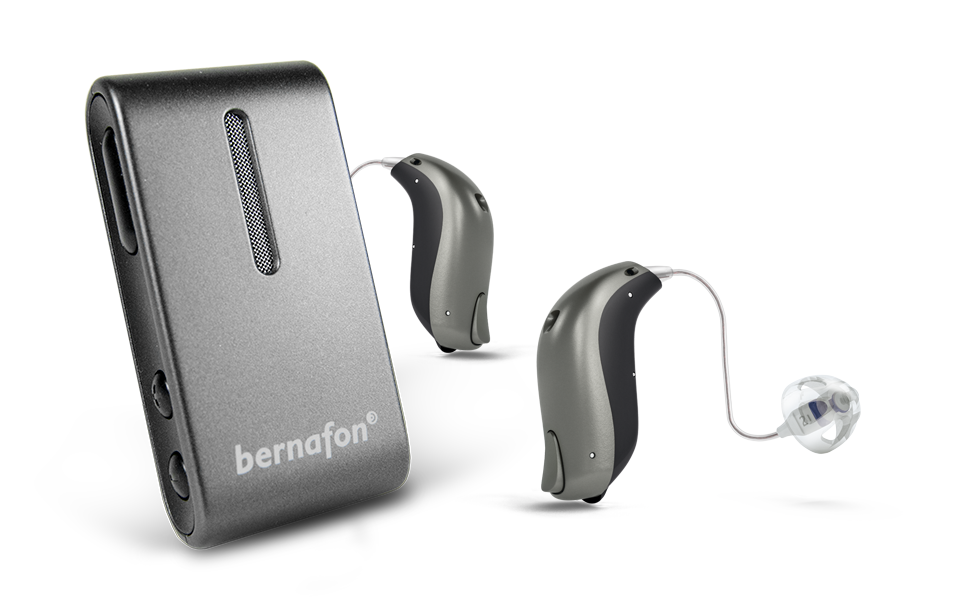Can't Hear in Noise, Here's Why
One of the biggest complaints that people with hearing loss have is that they can't hear well in noisy situations. The reason is simple, generally, most people with hearing loss can hear low-frequency sound well while their main issue is in the high frequencies. Noise is nearly all low-frequency sound, so they can hear that very well, the important parts of speech are high-frequency and they don't hear them well at all. While hearing aids go some way to correct the problem, sometimes, even the very best hearing aids don't fix the issue entirely. However, there are things that can help you out.

Remote Microphones
A remote microphone is a Bluetooth hearing aid accessory, most of the hearing aid brands offer them as an add on solution. With some of the hearing aid manufacturers you will need two devices, a remote microphone and a neck streamer. However, many of the brands offer direct connection remote microphones that don't need a streamer. They simply connect to your hearing aids directly, even up to thirty feet away.
Even with the best hearing aids, sometimes hearing in noise is difficult at best
I have used a remote mic in noisy situations and it has honestly been a revelation. It made it easy to hear my companion even though we were in a noisy cafe with a lot going on. It really was an outstanding experience. The thing is, even with the very best hearing aids, sometimes hearing well in noise is difficult. When your hearing is damaged, it causes a lot of issues with understanding in noise, while good hearing aids help to fix it, they do not return normal hearing or normal abilities.
For some people, hearing aids alone can do the job, for others of us though, our natural ability to sort speech from noise has been compromised and there is only so much hearing aids can do. In cases like that, you need all the help you can get and a remote mic is a fantastic aid to hearing.
Using Communication Strategies
If a remote mic isn't the answer for you, well then you need to think about other ways to help you hear better. We call these communication strategies and they are a large part of how we help people to hear better. There are certain things that you can do to give you a better chance to hear speech in noise.
Top Tips To Help You Hear in Noise
- If you are planning a night out, always try to think ahead, pick a quieter restaurant or a less busy time. Try to find a restaurant with soft furnishings and carpets. Hard surfaces are your enemy, the cause echoes and bounce sound around.
- As I said, pick the best day and time to dine out, a time when it is quiet.
- Always try to get a table in the quietest part of the restaurant away from the kitchen, bar, service area.
- Always try to sit with your back to the bulk of the noise, this will allow your directional microphones to work at their best.
- Try to make sure you are sitting in a well-lit area, makes it easier to see your companion's face.
- Request that staff turn down background music.
- Use your directional microphones programme if one is set up, as I said, always be sure to sit with your back to the main noise source.
- Don't freak out, try to relax and enjoy yourself, remember that even people with normal hearing experience greater difficulty in a noisy listening environment. Why wouldn't you?
If you like what you see, share it so others can benefit
Posted by Geoff

Geoffrey Cooling





Geoffrey (Geoff, anything else makes him nervous) Cooling is an Irish hearing aid blogger and has been involved with the hearing aid industry for over ten years. He has worked in private practice dispensing hearing aids and as a manufacturer's rep. He has written two books and they are both available on Amazon. He loves technology, passing on knowledge and is legendary for many other things, primarily the amount he curses, his dry and mischievous sense of humour and his complete intolerance of people who are full of themselves. Please feel free to connect with him
Looking For the Latest Hearing Aids or A Hearing Test?
Arrange a consultation with a trusted Independent hearing healthcare professional in your area



